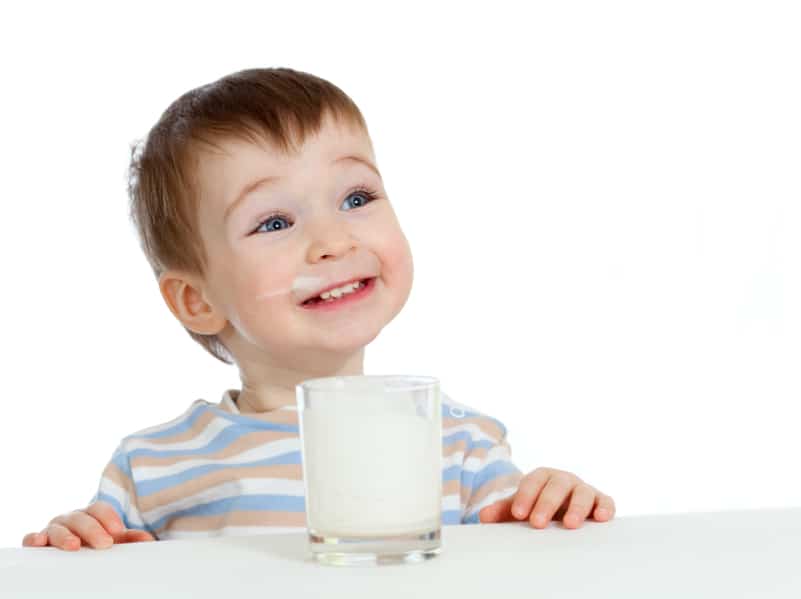When it comes to the best choice for milk, there’s an ongoing controversy and opinions from every side. Is the best choice raw, organic, cow, goat, soy, rice, or nut milk? Issues like dairy intolerance and convenience also help fuel our search for substitutes.
One of the things we’ve learned through our evolving relationship with food is that the more we process it, the more we strip it of its nutritional value—depleting the inherent health benefits that nature put there to begin with. This sad fact also holds true for milk.
In the beginning there was the breast, and from the beginning it has been nature’s intention for healthy mothers to nurse their babies. Breast milk is perfectly designed for the mental and physical development of the child—not only is it high in quality fat but also loaded with the necessary nutrients, probiotics, and enzymes that enhance digestibility and provide immune protection. Organic raw milk, be it from a cow or a goat, comes as close to the health benefits of breast milk as we can get.
Grass-fed raw milk is alive with enzymes and probiotics that allow us to easily and properly digest it, while enhancing healthy flora in our intestinal tract. Raw milk also contains a variety of whole-vitamin complexes, including the fat-soluble vitamin A and vitamin C (both of which are necessary to vitamin D absorption), plus the B vitamins.
When milk is pasteurized, the enzymes and probiotics are killed off, destroying the very substances that benefit the body. In the heat treatment of pasteurization, milk proteins are denatured, vitamin content is diminished or even destroyed, and the absorption of minerals is inhibited. It’s no wonder then that we experience abdominal cramping, colic, and allergies when we consume pasteurized milk.
The commercial milk industry does its best to convince us that raw milk is unsafe. But the truth is that as long as basic sanitation measures are followed, raw milk is inherently safe. As Ron Schmid reminds us in his excellent book The Untold Story of Milk, raw milk is “the first food of every mammal on the planet.” Mammals, including humans, wouldn’t have survived without it. Read this book if you want to come to a greater understanding of the many antimicrobial and immune support benefits provided by raw milk.
Know too, that to produce organic raw milk the cows must be better cared for and allowed to roam on green pastures, just as the grounds must also be kept cleaner. All of this extra care is in service to the protection of the environment and the production of healthy milk. As more and more families rediscover the value of raw milk,many find that their digestive distress and allergies subside. “Lactose Is Not Another Demon in Your Gut” is a good read on how to re-balance and regenerate your intestinal flora.
If you do choose to drink commercial pasteurized milk, it’s best to opt for whole or full-fat milk—preferably organic. That way you’re consuming milk from cows and goats raised with a minimal use of hormones and antibiotics. Full-fat milk is your best choice because the cream provides a concentrated source of calories that increases satiety, and therefore contentment. It may also provide the fat-soluble vitamin A, depending on the quality of the milk—but there are no guarantees. And a word of caution: the addition of synthetic vitamin D inhibits the body from absorbing calcium from the milk so try to find commercial milk without added synthetic vitamins.
If you drink pasteurized milk, you’ll want to enhance the missing beneficial bacteria by adding kefir, yogurt, sour cream, and fermented foods to your diet. For more on the benefits of fermented foods, check out The Art of Fermentation by Sandor Ellix Katz.
Due to a rise in dairy allergies and lactose intolerance (consequences of the enzyme deficiencies of pasteurized milk), many people now consider soy milk an alternative. However, soy milk comes with a host of health concerns. A 1990 FDA warning states that soy milk should not be given to infants because it “grossly lacks in the nutrients needed.” Read more about the dangers of soy infant formula here. Soy contains phytic acid that inhibits absorption of minerals, and protease inhibitors that block digestion of protein. Soy also has high levels of toxins, including aluminum. Elevated levels of phytoestrogens and isoflavones in soy have been found to depress thyroid function and wreak havoc on the hormonal system. Soy milk and formulas should certainly not be given to infants, toddlers, growing children—or adults for that matter.
Two safer alternatives are almond and rice milk. Of the two, almond milk has a higher protein and fat content. Rice milk is largely a source of carbohydrates that I don’t recommend. With both, make sure to read the labels carefully, as they’re often loaded with sugar, synthetic ingredients, and flavorings. Making your own almond milk using organically grown almonds is easy to do (see recipe below).
If you’re eliminating dairy milk from your diet, be sure to add good sources of complete protein and quality fats. And remember the golden rule of any food: stay as close as you can to the bounty of Mother Nature.
Almond Milk:
- Soak 1 cup raw, organic almonds in 3 cups filtered cold water overnight (okay to leave skins). The longer you soak the almonds, the creamier the milk will be.
- Drain the nuts from the soaking water the following morning.
- Place the nuts and 2 to 3 cups of fresh water into a blender (the amount depends on the consistency of milk you like). Blend.
- Pour through a strainer or cheesecloth.
- Add vanilla if desired.
Homemade almond milk only lasts 1 to 2 days in the refrigerator, so it’s best to make smaller portions more often.
Photo from iStock/oksun70


